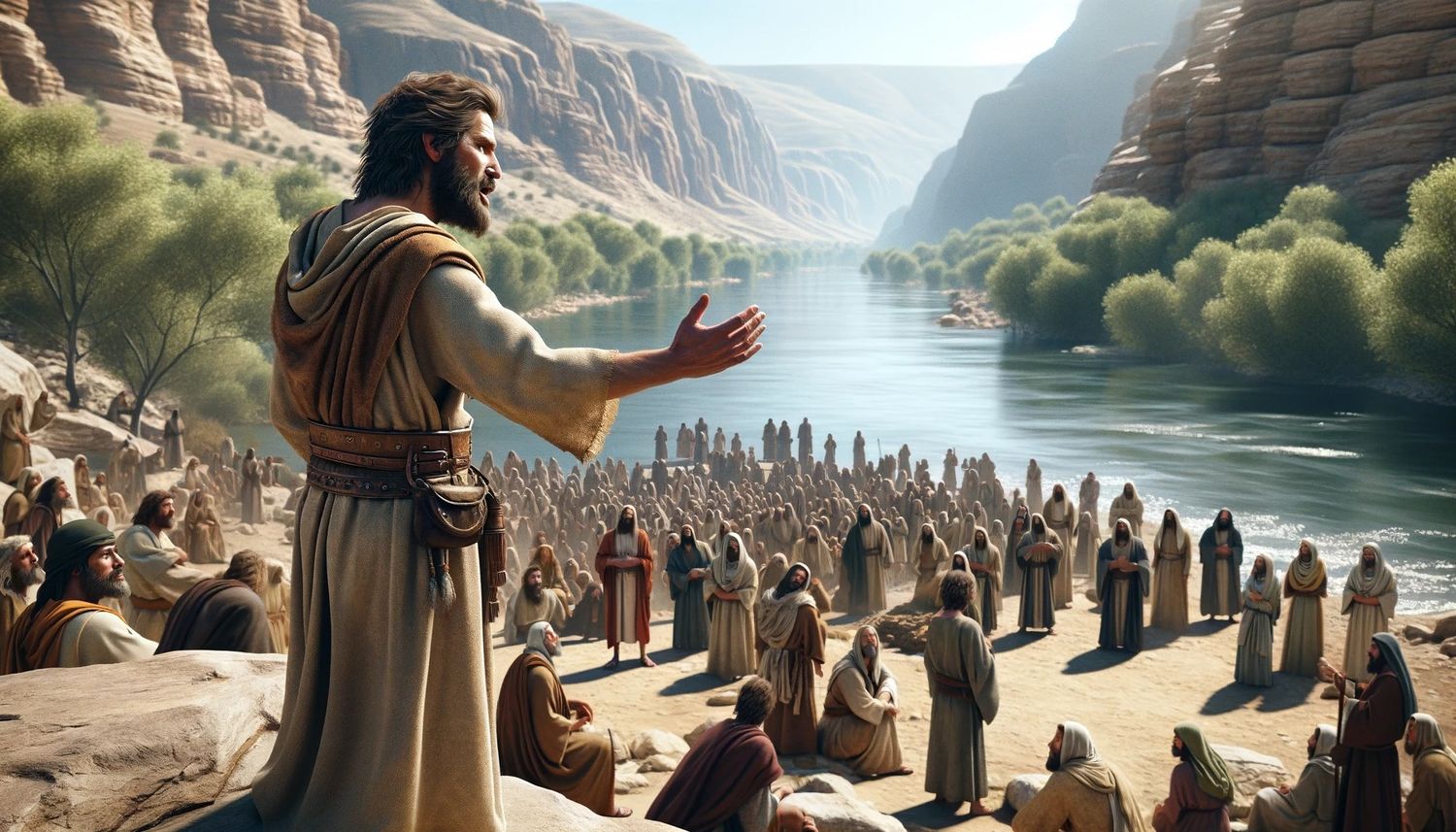Home>Theology and Spirituality>Why Did Jesus Not Save John The Baptist


Theology and Spirituality
Why Did Jesus Not Save John The Baptist
Published: February 22, 2024
Jason DeRose, Managing Editor at Christian.net, uses his expertise in religion and journalism to deepen understanding of faith's societal impacts. His editorial leadership, coupled with a strong academic background, enriches the platform’s diverse content, earning him recognition in both journalism and religious circles.
Explore the theological implications of why Jesus did not intervene to save John the Baptist. Gain insights into spirituality and divine purpose.
(Many of the links in this article redirect to a specific reviewed product. Your purchase of these products through affiliate links helps to generate commission for Christian.net, at no extra cost. Learn more)
Table of Contents
Introduction
The enigmatic nature of spirituality often leads to profound questions that challenge our understanding of faith and divinity. One such question that has perplexed many is, "Why did Jesus not save John the Baptist?" This inquiry delves into the complex interplay between divine will, human agency, and the enigmatic ways of God.
The story of John the Baptist, a pivotal figure in the Christian narrative, is shrouded in both reverence and tragedy. His unwavering devotion to his faith and his pivotal role as the herald of Jesus Christ make his fate a subject of deep contemplation. Understanding the circumstances surrounding his life and death offers a glimpse into the intricate tapestry of spiritual narratives and the profound mysteries of divine providence.
As we embark on this exploration, we will unravel the life and death of John the Baptist, examine the profound relationship between Jesus and John, and seek to comprehend the purpose behind John's tragic demise. Through this journey, we will endeavor to gain insight into the unfathomable ways of God and the profound significance of John the Baptist's role in the grand narrative of salvation.
Read more: Why Did John The Baptist Baptized Jesus
The Life and Death of John the Baptist
John the Baptist, a central figure in the Christian narrative, is renowned for his unwavering commitment to his faith and his pivotal role as the herald of Jesus Christ. His life was marked by a profound sense of purpose and an unyielding dedication to his calling. Born to elderly parents, Zechariah and Elizabeth, John's miraculous conception set the stage for his extraordinary destiny. From his early years, he exhibited a deep spiritual awareness, living as a desert-dwelling ascetic and embracing a life of simplicity and devotion.
John's ministry was characterized by a compelling message of repentance and spiritual renewal. He fearlessly proclaimed the imminent arrival of the Messiah, calling upon the people to prepare their hearts for the coming of the Savior. His baptismal rituals symbolized a profound cleansing of the soul, inviting individuals to embrace a transformative journey towards spiritual awakening.
However, John's unwavering commitment to truth and righteousness incurred the wrath of those in positions of power. His vocal condemnation of King Herod's immoral actions, particularly his marriage to Herodias, led to his imprisonment. Despite the confines of his cell, John remained resolute, unwavering in his faith and conviction.
The circumstances surrounding John's death are both tragic and emblematic of the profound challenges faced by those who champion righteousness in a world marred by corruption. Herod's fateful promise to his stepdaughter, Salome, resulted in John's beheading, a brutal and unjust end to the life of a man who embodied unwavering devotion to his beliefs.
John the Baptist's life and death serve as a poignant reminder of the profound sacrifices made by those who stand unwaveringly for truth and righteousness. His legacy endures as a testament to the transformative power of faith and the enduring impact of a life lived in service to a higher purpose. Through his unwavering commitment to his calling, John exemplified the profound courage and steadfastness that continue to inspire and resonate within the hearts of believers across the ages.
Jesus' Relationship with John the Baptist
The relationship between Jesus and John the Baptist transcends mere historical association; it embodies a profound spiritual connection rooted in divine purpose. John's pivotal role as the herald of the Messiah underscores the profound significance of their relationship. As cousins, their earthly kinship was intertwined with a far deeper spiritual bond, one that would shape the course of their intertwined destinies.
Jesus' baptism by John stands as a defining moment, symbolizing the transition from obscurity to public ministry. Despite John's initial reluctance, he recognized the divine imperative of this act, acknowledging Jesus' transcendent significance. The baptism became a transformative juncture, marking the commencement of Jesus' earthly ministry and affirming the profound spiritual synergy between the two figures.
Moreover, Jesus' profound reverence for John is evident in his poignant tribute to him, affirming that among those born of women, none was greater than John the Baptist. This acknowledgment underscores the immense spiritual stature of John and the profound impact of his ministry in preparing the hearts of the people for the advent of the Messiah.
The bond between Jesus and John the Baptist transcends familial ties, embodying a shared commitment to divine purpose and unwavering devotion to the fulfillment of God's redemptive plan. Their intertwined destinies, marked by sacrifice and profound spiritual significance, serve as a testament to the intricate tapestry of divine providence and the profound interconnectedness of their respective missions.
In essence, the relationship between Jesus and John the Baptist epitomizes the profound spiritual synergy that underpins the grand narrative of salvation. Their shared commitment to truth, righteousness, and the fulfillment of divine purpose serves as an enduring testament to the transformative power of faith and the profound impact of lives lived in unwavering devotion to a higher calling.
The Purpose of John the Baptist's Death
The tragic demise of John the Baptist, marked by his unjust execution at the behest of King Herod, raises profound questions about the purpose underlying his untimely death. While the circumstances surrounding his beheading are steeped in injustice and cruelty, the deeper spiritual significance of John's martyrdom unveils a profound purpose that transcends the temporal realm.
John the Baptist's death serves as a poignant testament to the unwavering commitment to truth and righteousness, even in the face of persecution and adversity. His uncompromising stance against moral transgressions, exemplified by his vocal condemnation of King Herod's illicit union, underscores the unyielding nature of his convictions. In embracing his martyrdom, John epitomized the profound sacrifice made by those who champion righteousness in a world marred by corruption.
Furthermore, the manner of John's death underscores the redemptive narrative that permeates the Christian faith. His martyrdom foreshadowed the ultimate sacrifice of Jesus Christ, serving as a precursor to the profound atonement that would unfold through the crucifixion and resurrection. In this sense, John the Baptist's death assumes a symbolic significance, aligning with the broader tapestry of divine redemption and the transformative power of sacrificial love.
Moreover, John's martyrdom served to galvanize the burgeoning Christian community, igniting a fervent commitment to the principles espoused by his ministry. His unwavering dedication to his faith, even in the face of persecution, inspired countless individuals to embrace a steadfast commitment to truth and righteousness. The enduring impact of his martyrdom reverberated throughout the early Christian community, fortifying their resolve and underscoring the profound significance of unwavering faith in the face of adversity.
In essence, the purpose of John the Baptist's death transcends the confines of mortal existence, embodying a profound spiritual significance that resonates across the annals of Christian history. His martyrdom stands as a testament to the transformative power of unwavering faith, the redemptive narrative that underpins the Christian faith, and the enduring impact of lives lived in unwavering devotion to divine purpose.
Understanding God's Plan
Understanding the intricate tapestry of divine providence and the enigmatic ways of God is a profound endeavor that transcends human comprehension. The narrative of John the Baptist's life and tragic death invites contemplation on the unfathomable nature of God's plan and the profound mysteries that underpin the human experience.
In the grand narrative of salvation, the life and death of John the Baptist serve as a poignant testament to the profound interplay between human agency and divine providence. His unwavering commitment to truth and righteousness, despite the adversities he faced, underscores the profound agency granted to individuals within the broader scope of God's redemptive plan. Through his ministry, John exemplified the transformative power of unwavering faith and the profound impact of lives lived in service to a higher purpose.
Moreover, the tragic circumstances surrounding John's death unveil the enigmatic ways of God's plan, transcending the temporal realm to embody a deeper spiritual significance. His martyrdom, marked by injustice and cruelty, aligns with the broader narrative of redemptive sacrifice that permeates the Christian faith. It serves as a precursor to the ultimate sacrifice of Jesus Christ, underscoring the profound atonement and transformative power of sacrificial love within the divine plan of salvation.
The interconnectedness of John the Baptist's mission with the advent of Jesus Christ illuminates the intricate orchestration of divine providence. Their intertwined destinies, marked by sacrifice and unwavering devotion, underscore the profound synergy that underpins God's redemptive plan. The culmination of John's ministry and his tragic death align with the broader narrative of redemption, serving as a testament to the transformative power of faith and the enduring impact of lives lived in unwavering commitment to divine purpose.
In seeking to understand God's plan, we are confronted with the inherent limitations of human comprehension in grasping the full scope of divine providence. The narrative of John the Baptist's life and death beckons us to embrace humility in the face of the ineffable ways of God and to find solace in the enduring truths of faith, sacrifice, and unwavering devotion. It invites us to contemplate the profound mysteries that underpin the human experience and to embrace a steadfast commitment to truth and righteousness, even in the face of adversity.
The enigmatic nature of God's plan, as exemplified through the life and death of John the Baptist, calls upon us to embrace a profound trust in the divine providence that transcends our mortal understanding. It beckons us to navigate the complexities of life with unwavering faith, recognizing that the profound mysteries of God's plan unfold in ways that surpass our finite comprehension, yet resonate deeply within the fabric of our spiritual journey.
Conclusion
In conclusion, the enigmatic narrative of John the Baptist's life and tragic death offers profound insights into the intricate tapestry of divine providence and the unfathomable ways of God's plan. His unwavering commitment to truth and righteousness, exemplified through his fearless ministry and ultimate martyrdom, serves as a poignant testament to the transformative power of faith and the enduring impact of lives lived in unwavering devotion to divine purpose.
The relationship between Jesus and John the Baptist, rooted in both earthly kinship and profound spiritual synergy, underscores the interconnectedness of their respective missions within the grand narrative of salvation. Their shared commitment to divine purpose and the redemptive significance of their intertwined destinies illuminate the profound orchestration of divine providence that transcends mortal understanding.
Furthermore, the purpose underlying John the Baptist's tragic demise extends beyond the temporal realm, embodying a symbolic significance that aligns with the broader narrative of redemptive sacrifice within the Christian faith. His martyrdom foreshadowed the ultimate sacrifice of Jesus Christ, underscoring the transformative power of sacrificial love and the profound atonement that permeates the Christian narrative.
In seeking to understand God's plan, we are confronted with the inherent limitations of human comprehension in grasping the full scope of divine providence. The narrative of John the Baptist's life and death beckons us to embrace humility in the face of the ineffable ways of God and to find solace in the enduring truths of faith, sacrifice, and unwavering devotion. It invites us to contemplate the profound mysteries that underpin the human experience and to embrace a steadfast commitment to truth and righteousness, even in the face of adversity.
Ultimately, the narrative of John the Baptist's life and tragic death serves as a compelling reminder of the transformative power of unwavering faith, the redemptive narrative that underpins the Christian faith, and the enduring impact of lives lived in unwavering devotion to divine purpose. It beckons us to navigate the complexities of life with unwavering faith, recognizing that the profound mysteries of God's plan unfold in ways that surpass our finite comprehension, yet resonate deeply within the fabric of our spiritual journey.














